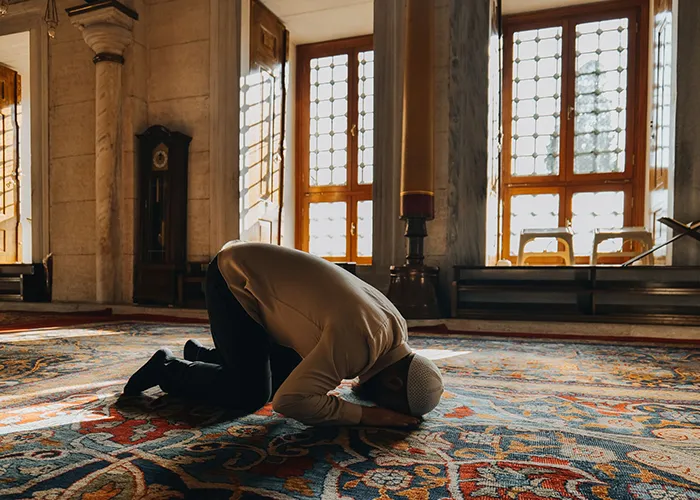Religious-Inquiries – Volume02 Issue16
Comparative Fiqh: Conditions of Clothing in Prayer According to Imam Khamenei, Ayatollah Sistani, and Ayatollah Makarem Shirazi
Introduction
In Islamic jurisprudence, the conditions governing the clothing of a person engaged in prayer (ṣalāh) hold significant importance. The integrity of the prayer, which is the pillar of religion, depends upon the observance of both external and internal purity. While there is a consensus on many principles among the esteemed Marājiʿ, certain nuanced differences do exist in their legal opinions (fatāwā).
This article aims to present a clear comparison between the rulings of Imam Sayyid Ali Khamenei, Ayatollah Sayyid Ali al-Sistani, and Ayatollah Naser Makarem Shirazi on the requirements for clothing during prayer.
Shared Foundations: Areas of Agreement
All three Marājiʿ unanimously agree on the following essential conditions for the clothing of the worshipper:
Purity of Clothing (Ṭahārah):
The clothes must be free from any form of ritual impurity (najāsah). Deliberate prayer in impure clothing invalidates the prayer.
Permissibility of Use (Mubāḥ):
Clothes must not be usurped (ghaṣbī). Praying in stolen or unlawfully possessed clothing is invalid, particularly if the person is aware of its status.
Prohibition of Non-Dhabīḥa Animal Products:
Clothing made from the skin or parts of animals that have not been slaughtered according to Islamic law is impermissible.
Prohibition of Animal Products from Forbidden Flesh:
Clothes derived from animals whose flesh is forbidden (ḥarām) are disallowed, particularly predatory animals.
Prohibition of Gold for Men:
Men are prohibited from wearing gold, whether as embroidery or jewellery, during prayer and otherwise.
Prohibition of Pure Silk for Men:
For men, wearing pure silk garments invalidates the prayer. For women, there is no such restriction.
Differences and Nuanced Rulings
While the foundational rules are shared, several nuanced distinctions emerge in their rulings:
1. Ignorance of Najāsah
Imam Khamenei:
If the individual was unknowingly ignorant (jāhil qāṣir) of the impurity ruling, the prayer is valid.
Ayatollah Sistani:
Differentiates between negligent and non-negligent ignorance. If negligent, prayer must be repeated; if non-negligent, valid.
Ayatollah Makarem:
If unaware of the impurity, the prayer is valid. If one knew of the impurity but forgot, they must repeat the prayer.
2. Discovering Impurity During Prayer
All agree:
If time permits, the impurity must be cleansed or the garment changed. If not possible without breaking the prayer, complete the prayer as it is, and it will remain valid.
3. Doubt About Clothing Being Pure
Imam Khamenei:
Presume purity unless previously known to be impure.
Ayatollah Sistani:
Advises checking. If checked and nothing found, prayer valid. If no checking, it is obligatory precaution to repeat.
Ayatollah Makarem:
Similar to Khamenei, prayer is valid in case of doubt.
4. Usurped Clothing and Forgetfulness
Imam Khamenei:
If one forgets that their clothing is usurped and performs the prayer, it remains valid.
Ayatollah Sistani & Ayatollah Makarem:
If the person himself is the usurper and forgets, they must repeat the prayer as an obligatory precaution.
5. Wearing Jewellery of Gold for Men
All three agree that it is prohibited and invalidates the prayer.
Ayatollah Makarem
Adds: it is recommended precaution to avoid even gold eyeglasses.
6. Khums-Unpaid Clothing
All agree:
If clothing is bought with actual unpaid Khums money, prayer is invalid unless authorised by the ḥākim al-sharʿī.
7. Predatory Animal By-Products
Imam Khamenei:
Not allowed, but if a single hair or by-product does not disturb the prayer, it may be overlooked.
Ayatollah Sistani:
Precautionarily avoids even predatory animal by-products. Exception: one hair does not invalidate.
Ayatollah Makarem
Strong precaution: even a single hair should be avoided.
8. Cross-Gender Clothing
All agree:
Wearing the attire of the opposite gender is discouraged but does not invalidate the prayer.
Unique Features of Each Marjaʿ
Imam Khamenei:
· Emphasises jāhil qāṣir (innocent ignorance).
· Allows continuation of prayer if correcting impurity disturbs prayer structure.
· Practical, lenient view on incidental predatory animal traces.
Ayatollah Sistani:
· Exceptionally detailed scenarios for limited clothing availability.
· Includes rulings on borrowing clothing, asking for it, or praying as a “naked person” if no clothing is available.
Ayatollah Makarem Shirazi:
· Stresses on women’s requirement to cover artificial jewellery and hair extensions in prayer.
· Warns against wearing clothing that undermines personal dignity.
· Detailed discussion on khums and zakāt-related financial concerns for clothing.
Conclusion
This comparative fiqh study reveals a beautiful harmony in Islamic jurisprudence, rooted in common principles, while recognising the nuanced approaches of our Marājiʿ. For the devout follower, adherence to their own Marjaʿ’s rulings ensures correctness, but understanding these differences cultivates greater fiqh literacy.
Ultimately, the sacredness of prayer demands not only attention to the soul but also to the outward conditions. Observing the purity, permissibility, and appropriateness of one’s attire in prayer is a manifestation of respect and submission before the Divine.
editor's pick
news via inbox
Subscribe to the newsletter.




